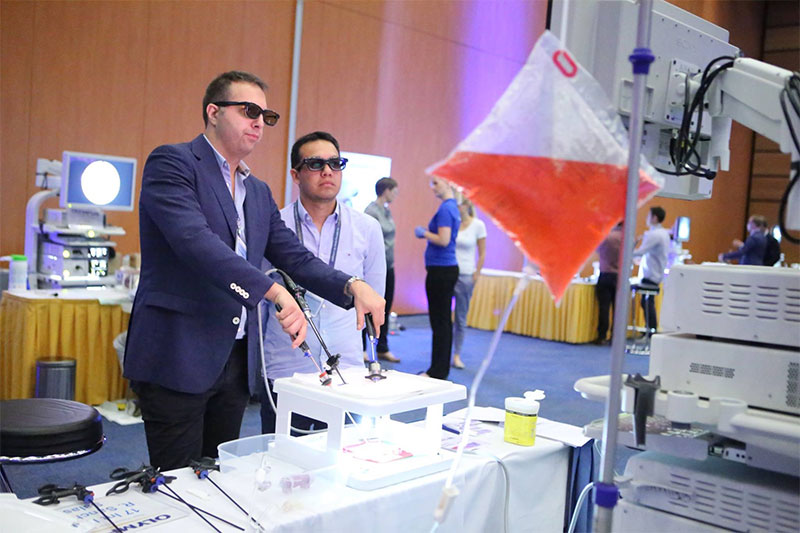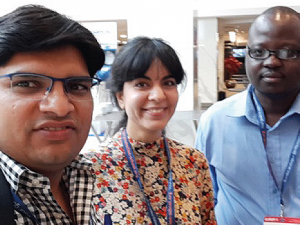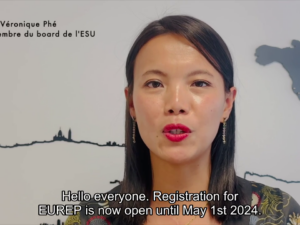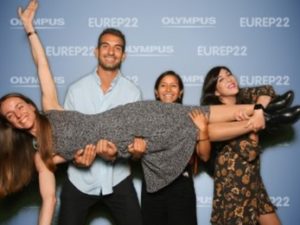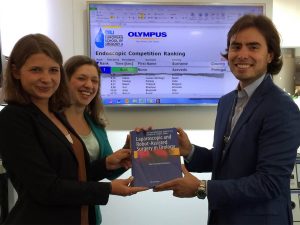Four esteemed EUREP tutors share their teaching experiences and their visions for the programme. Read on to find out more on what it takes to guide the next generation of young, promising urologists.
What makes a good tutor?
“Being an EUREP tutor is a privilege, but it requires more than enthusiasm. You have to have excellent surgical skills to effectively demonstrate and explain manoeuvres in detail. You need to stay current with training curriculums and simulators used,” said Dr. Domenico Veneziano (IT), Hands-on-Training (HOT) coordinator of EUREP.
“A good tutor listens well to the residents he/she trains. With an open mind regarding his/her own method of performing a procedure, a good tutor inspires and encourages residents to develop their own method based on evidence, experience and critical self-reflection,” said Dr. Stefan Haensel (NL).
Selection process
How are EUREP tutors selected? Prof. Dr. Ali Serdar Gözen (DE) stated that the candidates must have a surgical background, previous experience as a trainer, and scientific orientation as the ESU Training & Research Board makes the final selection based on these criteria.
Dr. Veneziano added, “The initial selection is carried out by the EAU Section of Uro-Technology (ESUT), EAU Section of Urolithiasis (EULIS), and the ESU through the training group. Interested parties should contact these sections to apply for the highly-regarded tutor role.”
HOT Coordinator of the ESU, Dr. Ben Van Cleynenbreugel (BE), said “Prospective tutors can come to us through different pathways. They can be young but qualified urologists in training who demonstrated promising skills and eagerness to learn during the HOT sessions. Or they can come highly-recommended by expert urologists. These selected tutors then go on to the ‘Training the Trainer’ programme to further hone and improve their teaching skills. This project was initiated with the help of Dr. Shekhar Biyani (GB), in close collaboration with ESUT and EULIS.”
Added value in tutoring
According to Dr. Veneziano, EUREP tutors have a conducive network to collectively develop new solutions and training protocols. He added, “Another benefit of being a tutor is that every time you teach someone, you also learn something new because you’ve explored other perspectives.”
“Guiding the residents is a rewarding role. It’s exhilarating and satisfying to know I’ve contributed to the future of urology,” said Prof. Dr. Gözen.
The tutor experience
“Every day, the tutors spend up to four hours straight in the training room. They do their best to deliver the same level of high-quality content and performance in every single session,” stated Dr. Veneziano.
At the beginning of each HOT session, the tutors sets expectations and states the learning objectives. Dr. Van Cleynenbreugel stated, “He/She explains the exercises and adapts them to the resident’s level whenever possible. The tutor gives the residents tips and tricks, and assists them if they experience difficulties. At the end of the training, the tutor assesses the residents. Were the participant’s expectations met? What was good or bad during the HOT session? What can be improved?”
Dr. Haensel described what happens during a HOT session on transurethral resection: “In between the theoretical sessions of the EUREP-course, the residents are offered a 50-minute individual session with a tutor. Four fully-equipped, state-of-the-art operation sets are used for the transurethral resection training. The prostate model used is made of engineered tissue which mimics the anatomy and tissue properties a normal prostate adenoma.”
HOT training beyond Europe
Prof. Dr. Gözen said that urologists from outside Europe can benefit from the HOT sessions. “They will have the opportunity to undergo the European training programme in Basic Laparoscopic Urological Skills (E-BLUS) and receive the E-BLUS certificate, the most-valued certificate on basic laparoscopy.”
He stated, “There is an increase in the number of urological associations, course organisers, and individual urologists who contact us. They want to be included in the European Association of Urology, learn and benefit from our training and membership programmes. We respond to every call and email, and propose tailored training programmes for each one.”
EUREP as a whole
“We have the passion for the hands-on training and this propels us forward. We have excellent, standardised and verified training programmes. EUREP is our kitchen where we use ingredients such as feedback and measurable results to produce, apply and optimise our content and performance,” said Prof. Dr. Gözen.
According to Dr. Veneziano, “The EUREP HOT faculty is not only made of great surgeons, but a group of friends. Right after the programme ends, we already look forward to seeing each other the following year.”
“It is inspiring to have the opportunity to work with many young residents who are eager to learn operative techniques and who think out-of-the-box. Sharing this wonderful experience to more than 20 tutors experts from all across Europe, leads to a greater professional network and lifelong friendships. I’m very grateful to the ESU for granting me the honour of being a tutor,” said Dr. Haensel.
Interested in being a EUREP tutor?
Contact Ms. Lotte Kraaijeveld (l.kraaijeveld@uroweb. org) or Mr. Ton Brouwers (t.brouwers@uroweb.org) for more information.

